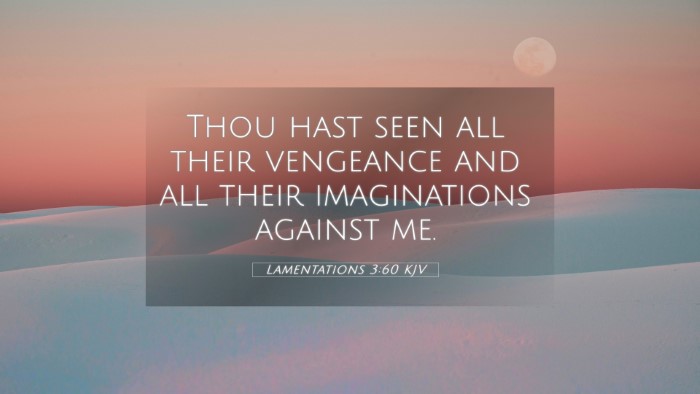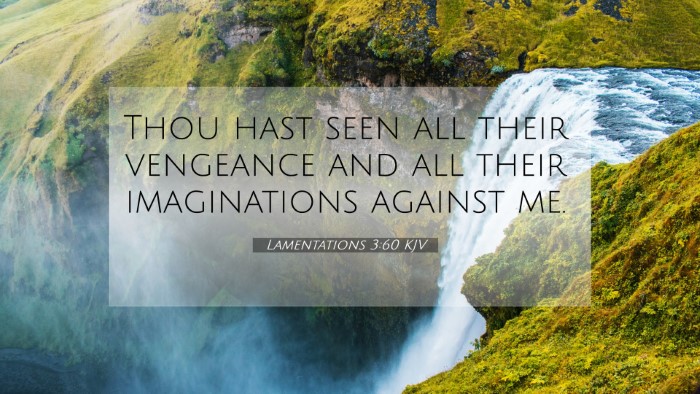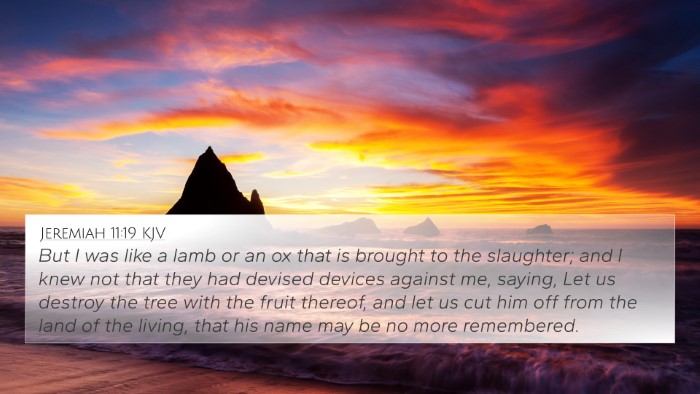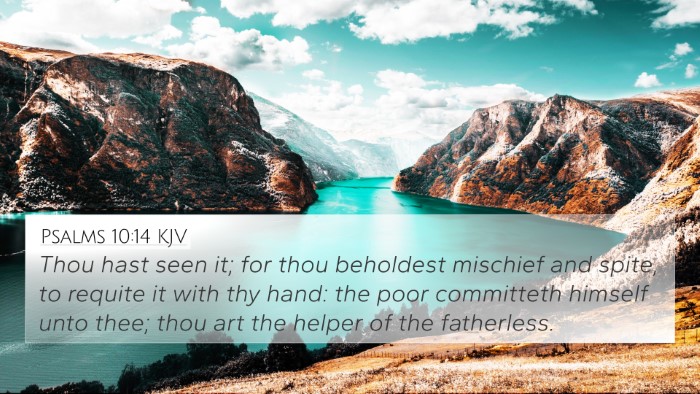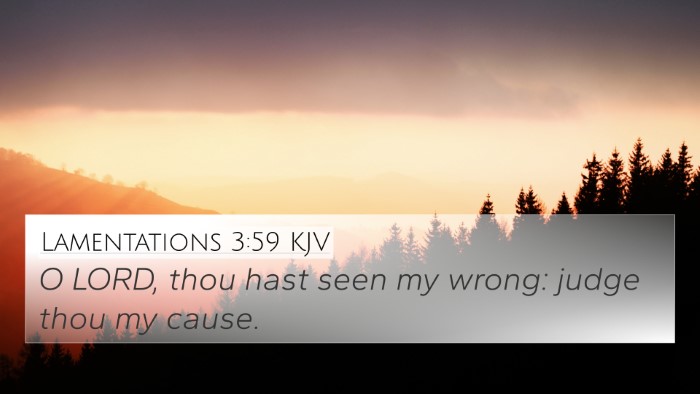Lamentations 3:60: Understanding Through Commentaries
Verse Reference: Lamentations 3:60
This verse presents significant insights into God's awareness of injustice and the suffering of His people.
Verse Context and Meaning
Lamentations, traditionally attributed to the prophet Jeremiah, expresses profound sorrow over the destruction of Jerusalem. The book serves as a lament for the devastation experienced by the Israelites and acts as a medium through which readers can explore the themes of grief, despair, and hope in divine restoration.
Commentary Insights
Matthew Henry's Commentary
Matthew Henry emphasizes God's omniscience and justice, suggesting that the acknowledgment of human suffering does not go unnoticed by God. He points out that amidst the lament, the assurance that God sees injustices offers a glimmer of hope. In verse 60, Henry highlights that God is aware of any plots against His people and will ultimately act justly.
Albert Barnes' Notes
Albert Barnes elaborates on the importance of God's remembrance of wrongs. He interprets verse 60 as an affirmation of God's righteousness—reminding His people that even when it seems like injustice prevails, God is attentive to all their afflictions and the wrongs committed against them. This attention from God reinforces the belief in divine justice and retribution.
Adam Clarke's Commentary
Adam Clarke introduces a more personal reflection on the verse, linking it to the emotional states of the faithful facing trials. He notes that the lamentation speaks to the hope that comes from knowing that God is keenly aware of the challenges faced by His followers. Clarke underscores the notion that a request for justice, coming from personal pain, is also a plea for God's merciful intervention.
Key Themes and Connections
Combining insights from these renowned commentaries, we can extract several thematic elements:
- Divine Justice: God sees all wrongs, reminding us that justice will ultimately prevail.
- Awareness of Suffering: The recognition of suffering sheds light on God’s engagement with His people.
- Hope in Despair: Even in lamentation, there exists a promise of restoration and relief through God’s intervention.
Bible Verse Cross-References
This verse can be cross-referenced with various scriptures that further illustrate the themes of justice, suffering, and divine oversight. Here are notable references:
- Psalm 10:14: "But you, God, see the trouble of the afflicted; you consider their grief and take it in hand."
- Proverbs 15:3: "The eyes of the LORD are in every place, keeping watch on the evil and the good."
- Jeremiah 11:20: "But, O LORD of hosts, who judges righteously, who tests the hearts and minds..."
- Isaiah 37:26: "Have you not heard? Long ago I ordered it. In days of old I planned it..."
- Romans 12:19: "Do not take revenge, my dear friends, but leave room for God’s wrath..."
- 1 Peter 3:12: "For the eyes of the Lord are on the righteous and his ears are attentive to their prayer..."
- Revelation 21:4: "He will wipe every tear from their eyes. There will be no more death or mourning or crying or pain..."
Understanding Through Comparative Analysis
To reinforce the understanding of Lamentations 3:60, connecting it with other Bible verses allows us to observe a thematic thread woven throughout the Scriptures:
- The Connection of Justice: Similar sentiments can be found in James 5:4 where the cries of the laborers reach the ears of the Lord.
- Amidst Despair: Psalm 34:18 resonates with those crushed in spirit, reminding them of God’s nearness.
- Hope Fulfilled: 2 Corinthians 1:3-4 highlights God as the source of all comfort.
Using Cross-References Effectively
Exploring and utilizing a variety of tools for cross-referencing can greatly enhance one’s understanding of biblical texts. Here are some methods for effective cross-referencing:
- Bible Concordance: Use a concordance to find words and themes that connect verses.
- Cross-Reference Guides: Utilize guides or systems that provide verses related to main scriptures.
- Thematic Studies: Engage in thematic cross-referencing to explore broad concepts across the Bible.
Bible Reference Resources
For those interested in deeper study, consider utilizing these comprehensive resources:
- Study Bibles: Many study Bibles include cross-references and notes to aid understanding.
- Online Bible Tools: Websites and apps that specialize in creating connections between scriptures.
- Commentary Collections: Series of commentaries that delve into thematic connections within the biblical narrative.

